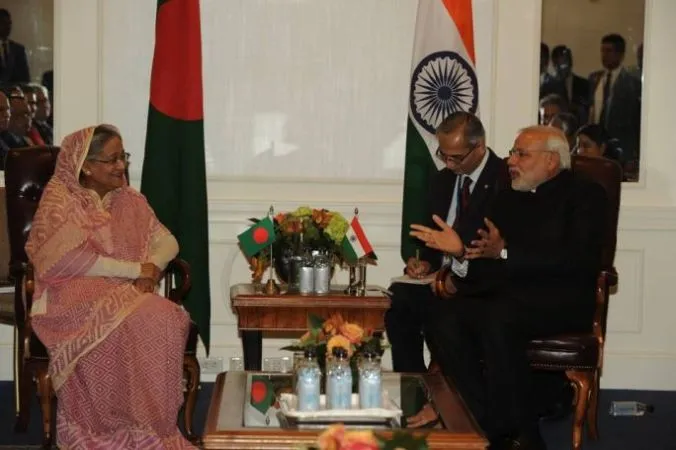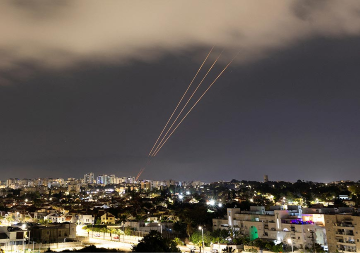The recent Pathankot terror attack has once again put the stress on friendly relations with neighbouring countries and Prime Minister Narendra Modi’s neighbourhood policy, especially with regard to Pakistan. In fact, it was with this purpose that Modi had invited all the head of governments of neighbours to his swearing-in ceremony in May 2014. And he has been able to improve relations with almost all neighbours except Pakistan. The most impressive in this regard has been Bangladesh. The relationship between India and Bangladesh has been growing very steadily. The peaceful resolution of the land boundary dispute between India and Bangladesh is a telling example of the growing bonhomie between the two countries. To sustain the trajectory, there is a need for widening the areas of cooperation and enhancing military cooperation.
The armed forces too play an important role in defining the nature of relations between countries. And the India-Bangladesh relations are not different. The involvement of Bangladesh Army is important for changing the dynamics of the bilateral relations that had a friendly beginning in 1971. However, it lasted only few years. The relationship changed after the military dictatorship took over power after the death of Mujibur Rahman, first Prime Minister of Bangladesh, in 1975. For long, the Bangladesh Army was sceptical of the country’s relationship with India. The apprehensions of the armed forces often prevented growth of the bilateral relationship as even the democratic government could hardly overlook the apprehensions.
However, it was the Bangladesh Army that took the initiative to transform the bilateral relations. During the period of military backed caretaker government in Bangladesh in 2007-08, the relations between the two neighbours started to improve. Then Bangladesh Army chief Gen Moeen Ahmad showed keen interest in improving the relationship and visited India in 2007. India also reciprocated by giving him a red carpet welcome generally accorded to head of states. Since then, the relations between both the militaries as well as the governments are growing.
There have been regular exchanges of visits between top leaderships of the armed forces of the two countries. India and Bangladesh also participated in joint exercises against terrorism. The two countries also carry out army-to-army staff talks to increase cooperation between the two armies. These measures have increased interactions between the armed forces resulting in improved understanding between them and change in perceptions. India is no more portrayed as the enemy in the war-games of the Bangladesh Army. This itself talks of the changing perception.
The change in the perception of the armed forces of Bangladesh has contributed significantly to the growth of the bilateral relation. Today, the elected government is able to take bolder steps. The most prominent is the Awami League government’s action against the insurgent groups of northeast India. Such an action would not have been possible without the support of the armed forces. This gesture by Bangladesh helped to gain the confidence of India.
However, these steps themselves are not sufficient to forge a long lasting relationship. The Bangladesh Army’s long connection with the Pakistan army cannot be overlooked. The Bangladesh Army has a history of deep connection with the Pakistan Army. Many of its early recruits were veterans of the Pakistan Army. Hence, its thinking and training model were in line with the Pakistan Army. The Bangladesh Army has changed substantially since the 70s and 80s as most of the old veterans have retired. Now, its top leaderships were recruited after the independence and so they are very different from their predecessors.
Still, they have connections as many of them have received training in Pakistan as both Pakistan and Bangladesh source large portion of their arms from China. There are also possibilities of some being influenced by the Pakistan’s propaganda.
Bangladesh army’s close links with China also cannot be overlooked. China is not only a major supplier of arms for the Bangladesh Army but also a destination for its officers to receive training. The country is one of the biggest buyers of Chinese arms. The Bangladesh Army, Navy and Airforce all have Chinese arms. The two countries have also signed a military cooperation, a rare kind of agreement that Bangladesh has with any country. Currently, Bangladesh is pursuing modernisation of its armed forces and is procuring weapons. Large portions of it are coming from China. Later this year, the country will be receiving submarine from China. This will deepen the dependence of Bangladesh on China further. As India and China compete for influence in South Asia, there are apprehensions that China might take advantage of its military ties with Bangladesh to corner India.
In such a scenario, for a long term friendship with Bangladesh, deeper military cooperation is quite important. Lessons from the China-Bangladesh relations suggest that military relations do play a crucial role in the bilateral relationship. Bangladesh’s dependence on Chinese arms has made its armed forces a major constituency in support of the nation’s relations with China.
If India wants to be the most important friend of Bangladesh, it should consider selling arms to it. This will be a win-win option for both the neighbours. This will reduce the need for the Bangladesh Army to go for arms from China, from where Pakistan too sources many of its arms. Indian arms to Bangladesh will also help in checking both China and Pakistan. This will also contribute to more interactions between the armed forces of the nations and boosting of Indian goodwill in Bangladesh, as many of their soldiers would come to India for training. This will really help in building friendship and trust for a long time.
The views expressed above belong to the author(s). ORF research and analyses now available on Telegram! Click here to access our curated content — blogs, longforms and interviews.




 PREV
PREV


